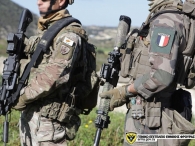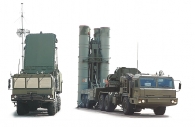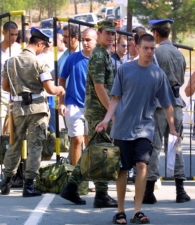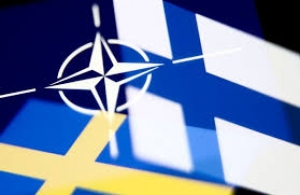THE EMERGING GEOPOLITICAL LANDSCAPE IN THE BALTIC, TURKEY AND THE CYPRUS ISSUE
THE
EMERGING GEOPOLITICAL LANDSCAPE
IN THE BALTIC, TURKEY AND THE CYPRUS ISSUE
By Dr. Aristos Aristotelous
Ex MP, Director of the Cyprus Centre for Strategic Studies
The accession of Finland and Sweden to the North Atlantic Treaty Organization (NATO) is changing the entire geopolitical and military landscape in the Baltic region. It has implications for the overall confrontation between Russia and the West, impacting international peace and security. While, further south, Turkey benefits from NATO enlargement - without ignoring the dangers and challenges of the Ukrainian crisis - nothing promising for the Cyprus issue appears on the horizon.
Geopolitically, the accession of Finland and Sweden creates a solid network of NATO member countries in the region. A petal of allied states isolating Russia in the Baltic Sea forms where lies one of the largest naval bases of the Russian fleet, in Kaliningrad, as well as the strategically important port of St. Petersburg, the second-largest Russian city.
The accession of Finland and Sweden to the Atlantic Alliance removes a massive area of neutral geographical space inserted between the NATO countries and the Russian Federation. It is of particular importance for this country's defense. Finland's accession offsets this Russian advantage, as NATO's borders now would shift eastward and will be in direct contact with Russia - on a 1,300-kilometer front.
Further West, with the accession of Sweden to the Alliance, that country, along with Denmark and Norway - both members of NATO - can resolutely block the Russian fleet's exit of the Danish Straits from the Baltic to the North Sea or vice versa. Under the circumstances, Moscow's military planning will be seriously affected, impairing the operation of its Navy in the region, whose action extends to the Mediterranean basin.
This type of horseshoe belt of allied states created in the Baltic is a continuation of a chain of member countries of the Alliance on the eastern borders of the NATO Europe to Russia. It stretches from Poland to Hungary, Slovakia, Romania, Bulgaria to Turkey. These countries are the NATO vanguard against Russia, with a force of 619,000 troops and a defense budget of $ 21.3 billion (IISS, 2021).
Turkey
As for NATO, Turkey, a historical rival and an occasional partner of Moscow, is also influenced by this development. With the enlargement of the Alliance, Russia will have to tackle a new but essential front, which will divert more and more of its interest and energy and absorb, at least in the short run, from its already limited military resources in other directions. In combination with the bleeding of Russian forces in Ukraine, this fact negatively affects the country's conventional military capabilities inside and outside Russia or in areas of competition with Turkey. Therefore, it creates room for relief in Ankara from the pressure of the Russian threat and possibly foreign and defense policy opportunities.
From another perspective, Russia's military intervention in Turkey's neighborhoods, such as Georgia in 2008, Crimea in 2014, and the ongoing war in Ukraine - not to mention the historical differences between Ankara and Moscow - is a source of Turkish continuous anxiety and concern.
Under such conditions of Russian confrontation with the West, the aim of Moscow's naval dominance and control in the Black Sea makes this basin an even more vital space for the security and defense of Russia and vice versa for Turkey. Consequently, the growing need for the Russian fleet to exit through the Turkish straits into the warm waters of the Mediterranean is an increased headache for Turkey.
Thus, in conclusion, we can say that the inclusion of Finland and Sweden in the Atlantic Alliance will formalize the creation of a new front of Russia - NATO confrontation, schizophrenically involving both deterrence and enhanced threats to international peace. Furthermore, the emerging geopolitical situation creates a mixture of advantages, challenges, and risks for Turkey. At the same time, it highlights to Turkey the importance of being part of NATO and the great value of this country's geographical location and military deployment as a member of the Western Alliance and a partner of the United States. Undoubtedly, the realization of this fact is something that Ankara is taking full advantage of to extract benefits from the West, either by blackmailing its fellow allies with deepening relations with Moscow or by providing obstacles like in the case of Finish and Swedish application to join NATO.
Finally, as far as the Cyprus issue is concerned, the emerging geopolitical landscape and Turkey's enhanced role and position as a NATO ally make it hard to exert pressure on Ankara for a more flexible policy and concessions. It does not seem, at least for the time being, that there are such elements that could substantially overturn the Turkish position on a two-state solution or the fait accompli at Varossia, paving the way for a fruitful dialogue.
20/05/2022
VIDEO: ΣΧΟΛΙΟ / COMMENTARY
ΣΗΜΑΝΤΙΚΑ / IMPORTANT
-
 THE MILITARY AND STRATEGIC LANDSCAPE IN THE EASTERN MEDITERRANEAN AND THE MIDDLE EAST, 2024
17 Νοεμβρίου 2024The study highlights the overall balance of power in the Eastern Mediterranean and the Middle East and evaluate the capabilities of the main powerful actors in the region. For this purpose, the study presents and analyzes data, quantitative comparisons and qualitative indications with reference to a representative number of selected countries, including Greece and Cyprus.περισσότερα / more
THE MILITARY AND STRATEGIC LANDSCAPE IN THE EASTERN MEDITERRANEAN AND THE MIDDLE EAST, 2024
17 Νοεμβρίου 2024The study highlights the overall balance of power in the Eastern Mediterranean and the Middle East and evaluate the capabilities of the main powerful actors in the region. For this purpose, the study presents and analyzes data, quantitative comparisons and qualitative indications with reference to a representative number of selected countries, including Greece and Cyprus.περισσότερα / more -
 ΟΙ ΣΤΡΑΤΙΩΤΙΚΕΣ ΔΥΝΑΜΕΙΣ ΣΤΗΝ ΚΥΠΡΟ 2023
31 Οκτωβρίου 2023Τα στρατιωτικάδεδομένα στην Κύπρο to 2023 όσον αφορά τις Τουρκικές Κατοχικές Δυνάμεις, παραμένουν στα επίπεδα των προηγούμενων χρόνων με ελάχιστες διαφοροποιήσεις, αλλά και πιο δυσμενή για την Εθνική Φρουρά. Αυτό είναι το γενικό συμπέρασμα από την παρουσίαση και ανάλυση των στρατιωτικών στοιχείων της έκθεση του Κυπριακού Κέντρου Στρατηγικών Μελετών.περισσότερα / more
ΟΙ ΣΤΡΑΤΙΩΤΙΚΕΣ ΔΥΝΑΜΕΙΣ ΣΤΗΝ ΚΥΠΡΟ 2023
31 Οκτωβρίου 2023Τα στρατιωτικάδεδομένα στην Κύπρο to 2023 όσον αφορά τις Τουρκικές Κατοχικές Δυνάμεις, παραμένουν στα επίπεδα των προηγούμενων χρόνων με ελάχιστες διαφοροποιήσεις, αλλά και πιο δυσμενή για την Εθνική Φρουρά. Αυτό είναι το γενικό συμπέρασμα από την παρουσίαση και ανάλυση των στρατιωτικών στοιχείων της έκθεση του Κυπριακού Κέντρου Στρατηγικών Μελετών.περισσότερα / more -
 Ο ΤΕΤΡΑΓΩΝΙΣΜΟΣ ΤΟΥ ΚΥΚΛΟΥ: ΑΣΦΑΛΕΙΑ ΚΑΙ ΕΓΓΥΗΣΕΙΣ
06 Σεπτεμβρίου 2016H επίλυσης του προβλήματος της ασφάλειας και των εγγυήσεων στο Κυπριακό προσομοιάζει με προσπάθεια τετραγωνισμού του κύκλου. Το αποτέλεσμα όμως θα κριθεί από τους συσχετισμούς δυνάμεων και την ικανότητα των μερών να στηρίξουν τις θέσεις τους στην τράπεζα των διαπραγματεύσεων, προσμετρώντας το κόστος και το όφελος των προτεινόμενων επιλογών.περισσότερα / more
Ο ΤΕΤΡΑΓΩΝΙΣΜΟΣ ΤΟΥ ΚΥΚΛΟΥ: ΑΣΦΑΛΕΙΑ ΚΑΙ ΕΓΓΥΗΣΕΙΣ
06 Σεπτεμβρίου 2016H επίλυσης του προβλήματος της ασφάλειας και των εγγυήσεων στο Κυπριακό προσομοιάζει με προσπάθεια τετραγωνισμού του κύκλου. Το αποτέλεσμα όμως θα κριθεί από τους συσχετισμούς δυνάμεων και την ικανότητα των μερών να στηρίξουν τις θέσεις τους στην τράπεζα των διαπραγματεύσεων, προσμετρώντας το κόστος και το όφελος των προτεινόμενων επιλογών.περισσότερα / more
ΑΝΑΚΟΙΝΩΣΕΙΣ / ANNOUNCEMENTS
-
 Τα πλεονεκτήματα και οι αδυναμίες της απόκτησης των ρωσικών S-400 από την Τουρκία
28 Νοεμβρίου 2017Πέραν των στρατηγικών μηνυμάτων που εμπεριέχει, η απόκτηση των ρωσικών αντιαεροπορικών S-400 προσφέρει στην Τουρκία στρατιωτικά πλεονέκτημα. Στην πράξη όμως είναι κάπως αμφίβολο αν οι…περισσότερα / more
Τα πλεονεκτήματα και οι αδυναμίες της απόκτησης των ρωσικών S-400 από την Τουρκία
28 Νοεμβρίου 2017Πέραν των στρατηγικών μηνυμάτων που εμπεριέχει, η απόκτηση των ρωσικών αντιαεροπορικών S-400 προσφέρει στην Τουρκία στρατιωτικά πλεονέκτημα. Στην πράξη όμως είναι κάπως αμφίβολο αν οι…περισσότερα / more -
 ΜΕΙΩΣΗ ΤΗΣ ΘΗΤΕΙΑΣ ΣΤΗΝ ΚΥΠΡΟ: ΕΠΙΠΤΩΣΕΙΣ – ΕΠΙΛΟΓΕΣ
26 Ιουνίου 2016(26.06.16) Χωρίς την εκ των προτέρων διασφάλιση των αναγκαίων προϋποθέσεων και εξισορροπητικών ρυθμίσεων η απόφαση για δραστική μείωση της θητείας κατά δέκα μήνες θα δημιουργήσει…περισσότερα / more
ΜΕΙΩΣΗ ΤΗΣ ΘΗΤΕΙΑΣ ΣΤΗΝ ΚΥΠΡΟ: ΕΠΙΠΤΩΣΕΙΣ – ΕΠΙΛΟΓΕΣ
26 Ιουνίου 2016(26.06.16) Χωρίς την εκ των προτέρων διασφάλιση των αναγκαίων προϋποθέσεων και εξισορροπητικών ρυθμίσεων η απόφαση για δραστική μείωση της θητείας κατά δέκα μήνες θα δημιουργήσει…περισσότερα / more

